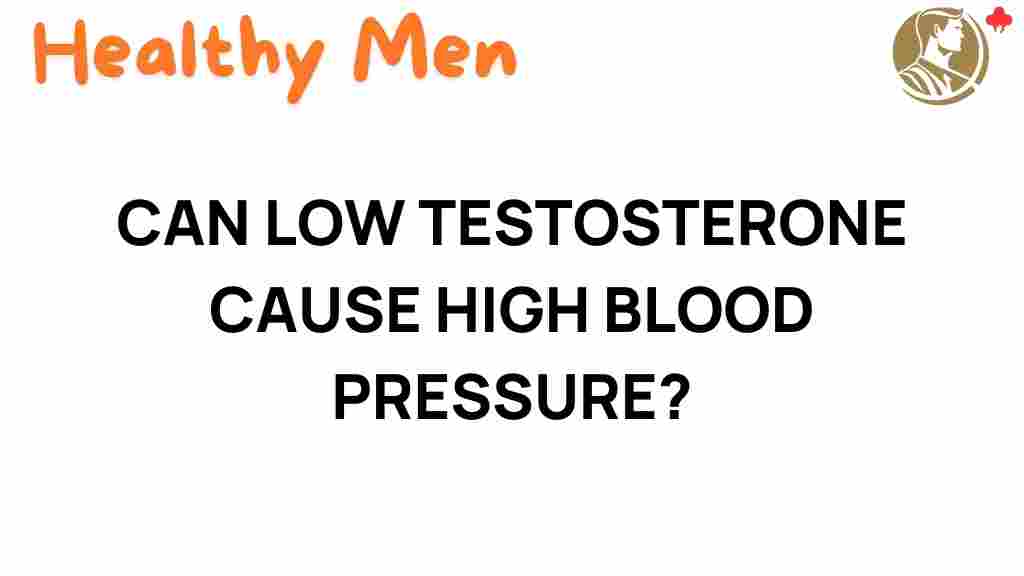Unraveling the Connection: Can Low Testosterone Elevate Blood Pressure?
Low testosterone levels, a condition often overlooked, can significantly affect various aspects of men’s health. Among the myriad of health risks associated with low testosterone is its potential link to elevated blood pressure, also known as hypertension. This article delves deep into the connection between testosterone and blood pressure, exploring how hormone imbalance can influence cardiovascular health.
Understanding Testosterone and Its Role in Men’s Health
Testosterone is a vital hormone primarily produced in the testicles in men. It plays a crucial role in several bodily functions, including:
- Regulating libido and sexual function
- Maintaining muscle mass and strength
- Contributing to bone density
- Influencing mood and energy levels
As men age, testosterone levels naturally decline, which can lead to various health issues. This decline can manifest as fatigue, depression, decreased libido, and sometimes, elevated blood pressure.
The Link Between Low Testosterone and Blood Pressure
Recent medical research suggests that there may be a significant connection between low testosterone levels and increased blood pressure. Here’s how they are interconnected:
1. Hormone Imbalance and its Effects
Testosterone plays a pivotal role in maintaining vascular health. When testosterone levels drop, it can lead to:
- Decreased nitric oxide production, which is vital for blood vessel dilation.
- Increased levels of fat accumulation, leading to obesity, a major risk factor for hypertension.
- Impaired glucose metabolism, which is linked to cardiovascular diseases.
2. Impact on Cardiovascular Health
Low testosterone is associated with an increased risk of cardiovascular issues, including hypertension. Men with low testosterone might experience:
- Increased arterial stiffness
- Higher inflammatory markers
- Altered lipid profiles
How Low Testosterone Can Contribute to Hypertension
The relationship between low testosterone and hypertension is complex. Here are some mechanisms through which low testosterone may lead to high blood pressure:
1. Vascular Resistance
Low levels of testosterone can lead to increased vascular resistance, making it harder for blood to flow freely, which raises blood pressure.
2. Weight Gain and Obesity
Testosterone helps regulate fat distribution. Low testosterone often leads to weight gain, particularly around the abdomen. Obesity is a known risk factor for hypertension.
3. Insulin Resistance
Testosterone deficiency can contribute to insulin resistance, which is often associated with metabolic syndrome—a cluster of conditions that increase the risk of heart disease and hypertension.
Step-by-Step Analysis: Assessing the Risk
To understand the impact of low testosterone on blood pressure, consider the following steps:
Step 1: Recognize Symptoms of Low Testosterone
Common signs include:
- Fatigue and decreased energy
- Reduced libido
- Increased body fat
- Difficulty concentrating
Step 2: Monitor Your Blood Pressure
Regular check-ups can help you keep track of your blood pressure levels. The American Heart Association defines hypertension as a reading of 130/80 mm Hg or higher.
Step 3: Consult a Healthcare Provider
If you suspect low testosterone, consult a healthcare provider who can conduct blood tests to measure your testosterone levels. Treatments may include lifestyle changes, hormone replacement therapy, or other interventions.
Health Risks Associated with Low Testosterone and Hypertension
Low testosterone and hypertension can lead to serious health complications, including:
- Increased risk of heart attack and stroke
- Higher likelihood of developing type 2 diabetes
- Potential for developing chronic kidney disease
Troubleshooting Tips for Managing Low Testosterone and Blood Pressure
If you are dealing with low testosterone and elevated blood pressure, consider these tips:
1. Lifestyle Modifications
- Exercise Regularly: Engage in both aerobic and strength training exercises to boost testosterone levels and improve cardiovascular health.
- Maintain a Healthy Diet: Focus on a balanced diet rich in whole foods, fruits, vegetables, lean proteins, and healthy fats.
- Manage Stress: Practice stress-reduction techniques such as yoga, meditation, or deep-breathing exercises.
2. Medical Interventions
In some cases, medical treatment may be necessary. Options include:
- Testosterone replacement therapy
- Medications to manage blood pressure
3. Regular Monitoring
Keep track of your testosterone levels and blood pressure through regular check-ups to ensure you are managing your health effectively.
Conclusion: The Importance of Addressing Low Testosterone and Blood Pressure
Understanding the connection between low testosterone and blood pressure is crucial for men’s health. Addressing hormone imbalances and maintaining healthy testosterone levels can significantly improve cardiovascular health and reduce the risk of hypertension. Regular monitoring, lifestyle modifications, and consulting with healthcare professionals are essential steps in managing these interconnected health risks.
For more information on men’s health and hormone management, visit this resource.
This article is in the category Conditions and created by healthymen Team
